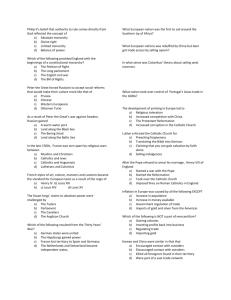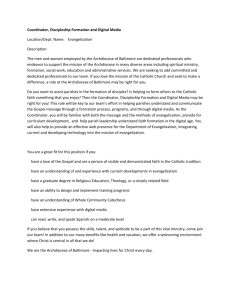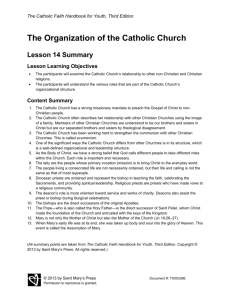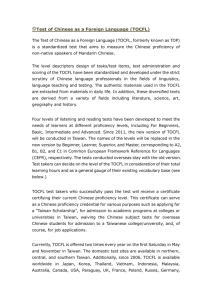The Holy See
advertisement
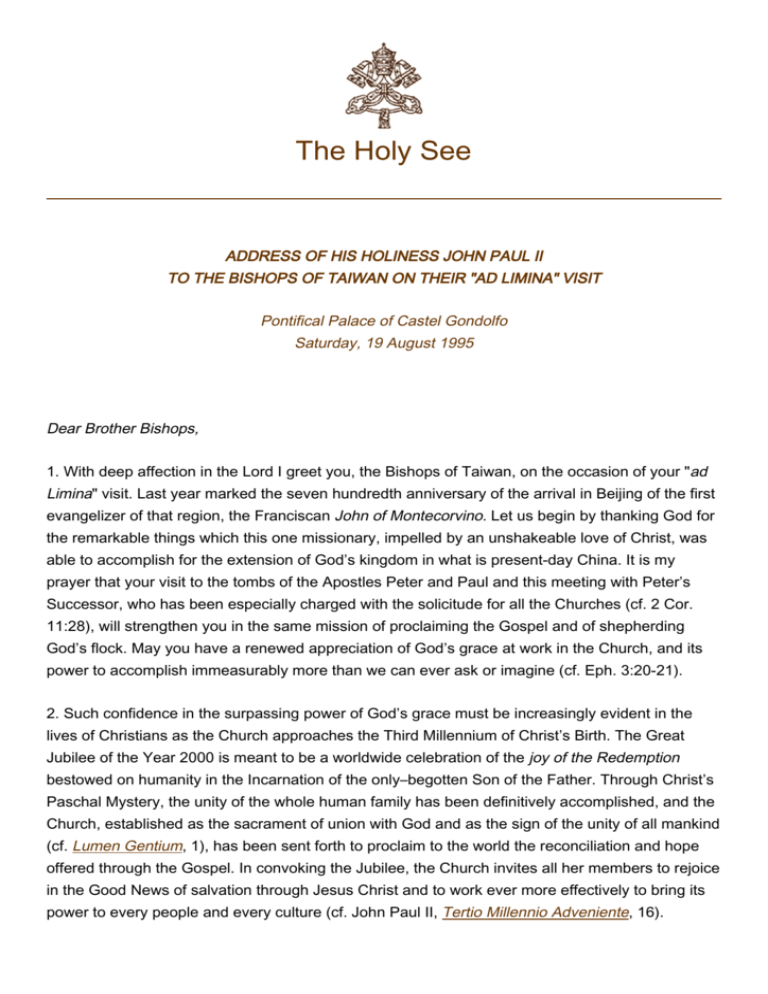
The Holy See ADDRESS OF HIS HOLINESS JOHN PAUL II TO THE BISHOPS OF TAIWAN ON THEIR "AD LIMINA" VISIT Pontifical Palace of Castel Gondolfo Saturday, 19 August 1995 Dear Brother Bishops, 1. With deep affection in the Lord I greet you, the Bishops of Taiwan, on the occasion of your "ad Limina" visit. Last year marked the seven hundredth anniversary of the arrival in Beijing of the first evangelizer of that region, the Franciscan John of Montecorvino. Let us begin by thanking God for the remarkable things which this one missionary, impelled by an unshakeable love of Christ, was able to accomplish for the extension of God’s kingdom in what is present-day China. It is my prayer that your visit to the tombs of the Apostles Peter and Paul and this meeting with Peter’s Successor, who has been especially charged with the solicitude for all the Churches (cf. 2 Cor. 11:28), will strengthen you in the same mission of proclaiming the Gospel and of shepherding God’s flock. May you have a renewed appreciation of God’s grace at work in the Church, and its power to accomplish immeasurably more than we can ever ask or imagine (cf. Eph. 3:20-21). 2. Such confidence in the surpassing power of God’s grace must be increasingly evident in the lives of Christians as the Church approaches the Third Millennium of Christ’s Birth. The Great Jubilee of the Year 2000 is meant to be a worldwide celebration of the joy of the Redemption bestowed on humanity in the Incarnation of the only–begotten Son of the Father. Through Christ’s Paschal Mystery, the unity of the whole human family has been definitively accomplished, and the Church, established as the sacrament of union with God and as the sign of the unity of all mankind (cf. Lumen Gentium, 1), has been sent forth to proclaim to the world the reconciliation and hope offered through the Gospel. In convoking the Jubilee, the Church invites all her members to rejoice in the Good News of salvation through Jesus Christ and to work ever more effectively to bring its power to every people and every culture (cf. John Paul II, Tertio Millennio Adveniente, 16). 2 I am pleased to know that the need for a renewed evangelization is being emphasized in the novena of years programmed by the Chinese Regional Catholic Bishops Conference in preparation for the Great Jubilee, and that next year, 1996, will be specifically devoted to the themes of Catechesis and Evangelization. A great resource in this regard will be the Chinese translation of the "Catechism of the Catholic Church". The Catechism transmits a profound sense of the unity and coherence of the Christian message, a message which speaks directly to the hearts and minds of people in every age and situation. The overwhelming response to the Catechism discloses the remarkable thirst for God and for the spiritual life which is present even in highly secularized societies. When we consider the emptiness and aridity of so much of modern life, can we not see in this interest yet another sign that in our time "God is opening before the Church the horizons of a humanity more fully prepared for the sowing of the Gospel" (John Paul II, Redemptoris Missio, 3)? 3. As Shepherds of the People of God in Taiwan, you will want to make every effort to encourage your people to pray and work in communion with the whole Church that the spiritual and material preparations being made for the Great Jubilee of the Holy Year 2000 will bear fruit in inner renewal and the growth of an authentic missionary spirit in all the baptized. I am confident that your Conference’s Episcopal Commission for the Celebration of the 2000th Anniversary of the Birth of Jesus will seek to make this celebration awaken throughout the Church in Taiwan an ever more lively sense of its links to the Universal Church through communion with the other particular Churches and with this Apostolic See. In this time of grace for the whole Church, Chinese Catholics too must feel deeply committed to the new evangelization and to the preaching of the Gospel ad gentes. Both aspects of the Church’s missionary mandate are essential to authentic ecclesial renewal. Asia is waiting to hear the Word of God, and it must be above all Asians themselves who ensure that it takes deep root in the Continent’s ancient cultures. In your case, the inculturation of the Gospel in your own culture must show that there can be no opposition or incompatibility between being at one and the same time truly Catholic and authentically Chinese. 4. For this very reason I encourage you to involve all Taiwan’s Catholics in the work of evangelization. I am thinking especially of the significant contribution waiting to be made by women, by young people, by men and women Religious, by the Catholic University and the Seminaries, and by Catholic professionals in the fields of art, science and social communication. The lay faithful need to be encouraged to recognize and overcome all separation between their faith in Christ and their daily activities at home, at work and in society (cf. John Paul II, Christifideles Laici, 34). At every level of ecclesial life the Gospel should be experienced and shared as a liberating gift which enables men and women to live in joy and peace, to foster reconciliation and to work with self–giving love for the spiritual and material good of others. Needless to say, an irreplaceable role in this great work of renewal falls to the clergy, both 3 diocesan and religious. Today more than ever priests must have the mind and heart of missionaries, especially with regard to those who do not yet know Christ (cf. John Paul II, Redemptoris Missio, 67). It is very important to ensure that a missionary spirit is fostered in seminary training and in programmes of permanent formation, so that the priest’s life and ministry will reflect the urgency of the mission expressed in those well-known words of Saint Paul: "Woe to me if I do not preach the Gospel!" (1 Cor. 9:16). The core of all priestly spirituality must be a constant rekindling of the grace received in Holy Orders, an ever closer configuration to Christ and a greater participation in the burning love of his Sacred Heart. Your own example and leadership must inspire your priests to cultivate the virtue of pastoral charity. Thus you and your co-workers will enter more fully into the hopes, needs, problems and situations of the people to whom you minister, in order to find ever more effective ways of proposing the Gospel to all (cf. John Paul II, Pastores Dabo Vobis, 70). 5. I emphasize the need for a renewed commitment to evangelization because you yourselves are aware of the difficulties which this entails, in particular when we consider the declining number of clergy and the increasing pastoral needs of the faithful, especially of those who are still young in the faith. This situation calls for creative solutions, wise stewardship of present resources and careful pastoral planning for the future. There is an urgent need to promote vocations to the priesthood and religious life, intensifying the noteworthy efforts being made to help young men and women to recognize and respond to God’s call. Taiwan’s numerous Religious Communities have been and continue to be a great spiritual and material resource for the life of the Church. All around you there are signs of budding life in the Spirit. As Pastors, it is your task to discern, nourish and develop every new gift and hope. 6. As members of the great Chinese family, the Catholics of Taiwan feel an affectionate closeness to their brothers and sisters in the faith on the Mainland. Indeed, you gladly acknowledge your responsibility to assist them in their difficult spiritual situation. Even more than Catholics in other countries, you sense that you are a Sister Church to the Catholic community there, especially when there is a growing appreciation among them of their need to feel themselves more a part of the universal Catholic Church. For my part, I know that the Catholic community throughout China, in union of faith with the rest of the Catholic Church, prays for the Pope, recognizing generally in this way the specific nature of the Petrine ministry as an essential aspect of Christ’s will for his Church. But the great majority of Chinese Catholics, precisely in order to live this fidelity in fullness, have chosen the path of suffering and silence. With deep affection, our hearts turn to these brothers and sisters of ours who suffer great hardship, thankful for their generous and heroic example. We hope and pray that also the others will work with renewed faith and strength for full communion and unity with the universal Church and the Successor of Peter. I am well aware that the current situation of the Catholic community is a source of painful concern 4 for all Chinese Catholics. Each of them has a special place in my heart as Pastor of the universal Church, and for all I pray the Lord who has willed that his Church be one, under one Shepherd. Today, through you, I repeat the exhortation which I addressed to them in Manila last January: "I earnestly invite you to seek paths to communion and reconciliation, paths which draw their light and inspiration from the Truth himself: Jesus Christ" (John Paul II, Message to Catholics in China, 14 Jan. 1995). I know that many are wondering how this reconciliation can come about. All need to move; all have to turn towards Jesus Christ, who calls us to unity and to communion. Everyone must discover the steps which lead to reconciliation. Everyone must bring along his whole self, his past, his moments of courageous witness and his moments of weakness, his present sufferings and his hopes for a better future. What we are speaking of is a long and difficult journey. The goal is clear enough, but the path leading to it seems still obscure. We need to invoke the light of the Spirit and to let ourselves be guided by his inspiration. You, the Bishops of Taiwan, are called to do all you can to promote harmony, patience and understanding, fraternal love and reconciliation among all the Catholics of the great Chinese family, in a spirit of charity and with full respect for the growth of the Church on the Mainland. At this delicate moment, I ask all of you to pray unceasingly for this intention. 7. Dear Brothers, our meeting brings to mind all the faithful entrusted to your pastoral care, to whom I feel very close. Please assure the priests, Religious and lay members of your local Churches in Taiwan of my deep affection in the Lord. At the same time, I renew the assurance of my love, encouragement and good wishes to all the Catholic members of the greater Chinese family. If these brothers and sisters of ours already pray for the Pope and in some way recognize in him the special ministry of Peter, how much longer will it be before he can embrace them and confirm them in faith and unity? With these sentiments, I commend you and the whole Church in Taiwan to the loving intercession of Mary, Queen of Peace, and I cordially impart my Apostolic Blessing. © Copyright 1995 - Libreria Editrice Vaticana © Copyright - Libreria Editrice Vaticana



